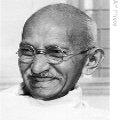Culture and Tourism Minister Ambika Soni congratulated the people of India and said the government is happy that Mahatma Gandhi's heritage "to which we are emotionally bonded" has been saved. An Indian businessman, Vijay Mallya, successfully bid for the items of the Indian independence leader for $1.8 million in New York after frantic efforts by the Indian government to stop the controversial auction failed. His representative says the items have been bought for India.
The items include Gandhi's trademark wire-rimmed spectacles, a brass bowl and plate, worn leather sandals and a pocket watch. Gandhi is a national icon who inspired millions of Indians to join a non-violent struggle against British rule. He led an ascetic life and had few possessions.
Minister Soni says the government did not want the belongings of a man who never believed in private property to be put up for sale. But she says the government cooperated with the Indian businessman to ensure their return to India when the auction went ahead.
"We wanted to prevent the commercialization which takes place, especially at a public auction," Soni said. "We did not want people to bid for Gandhi's things because for us they are invaluable, we cannot fix a price." There has been much anguish among many of Gandhi's followers that a price was put on the possessions of a man who embraced poverty and rejected materialism. But there is also a huge sense of relief that they are being brought back to India. Among the first to express "delight" that Gandhi's items are returning home is the Indian leader's great grandson, Tushar Gandhi. He had launched a fundraising campaign to buy the items, but abandoned the drive after the government took over efforts to retrieve them.
Tushar Gandhi told VOA News that Gandhi's meager possessions are "national treasures" and must remain in India. "This was a matter of national prestige, somebody whom we refer to as father of the nation if his belongings were auctioned off abroad that was shameful in itself," Gandhi said, " but if somebody abroad had bought off those things and taken them away it would have been a national disgrace." Tushar Gandhi also says the revered former leader's followers believe in "Gandhian" philosophy - ensuring the return of the items to India - by "peacefully" building public opinion on the matter. "We created public opinion which forced a lot of people to act. If this was kept without any publicity India would not have known about it and it would have just gone away somewhere else," Gandhi said. "We created public opinion about it, we forced the government to act because of the public opinion." The items sold have great significance. Gandhi had said that the spectacles were the "eyes" which gave him the vision to free India. His great grandson says the leader ate his last meal before he was murdered from the plate and bowl, and had made the sandals with his own hands.
It may take two weeks for the items to return home because some legal issues of the sale have to be resolved.
Gandhi's followers want his items to be put in museums so that future generations can draw inspiration from the ideals of one of modern India's most revered leaders. By Anjana Pasricha New Delhi 06 March 2009

